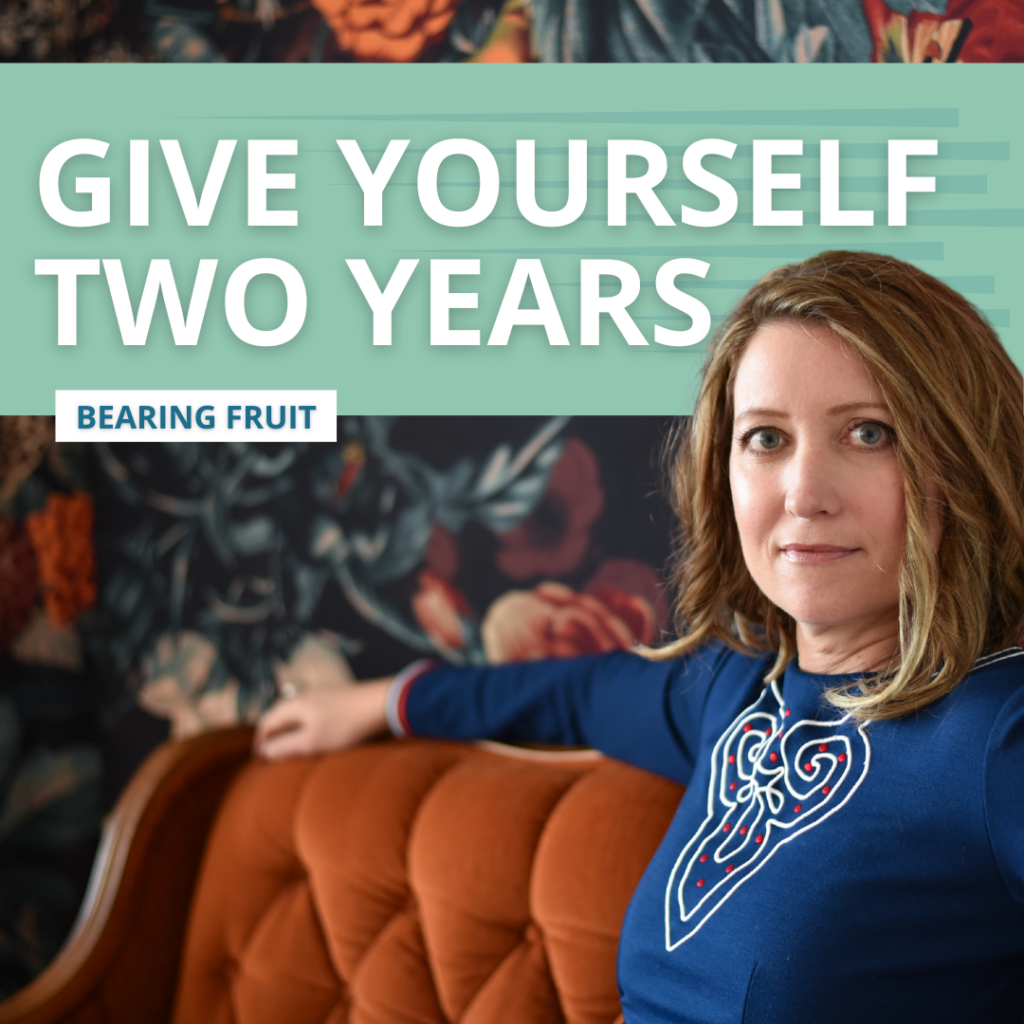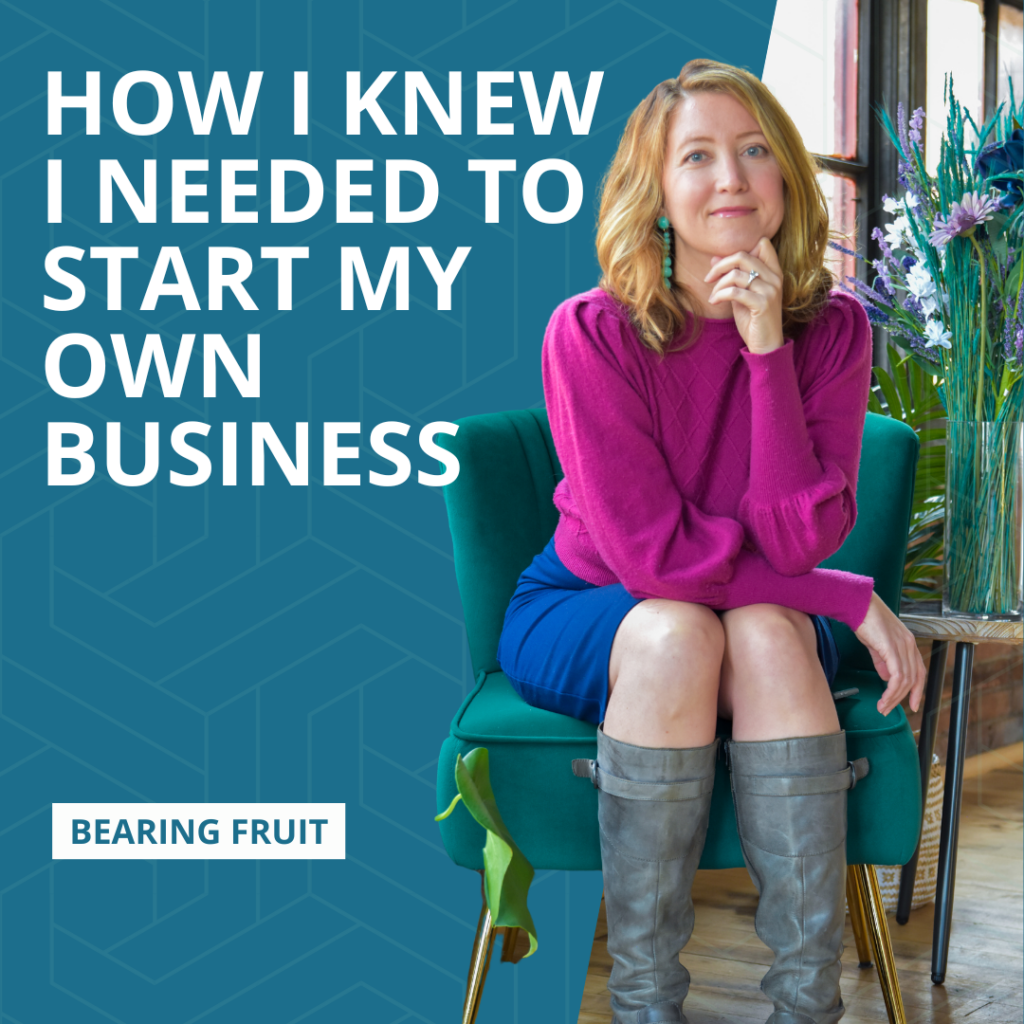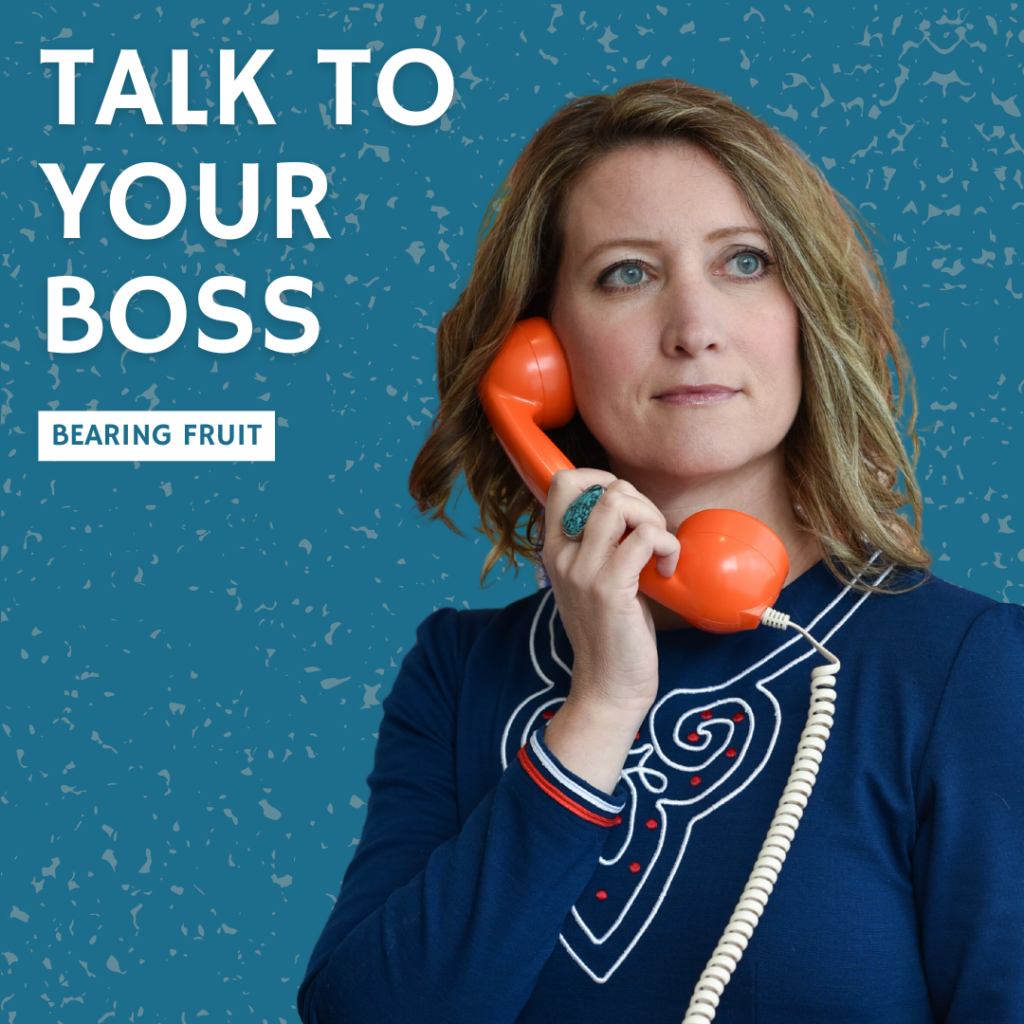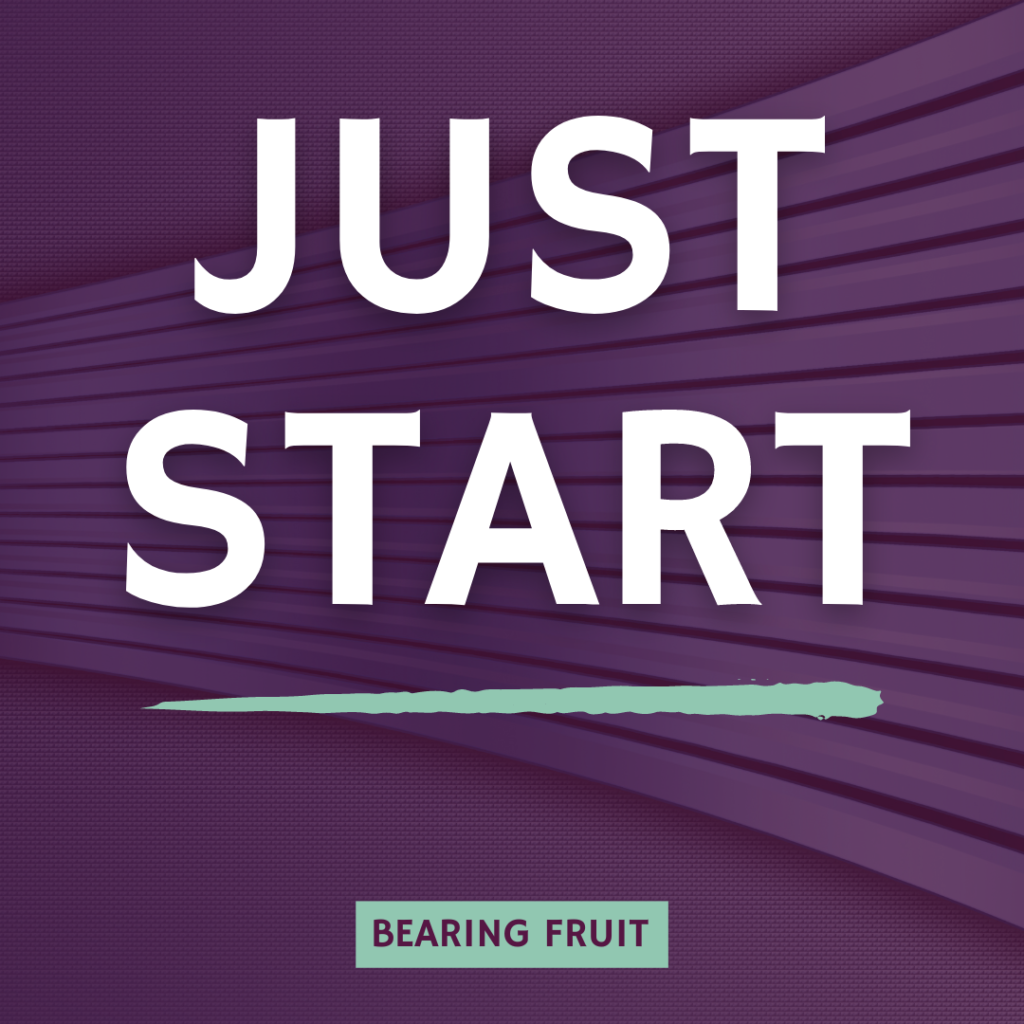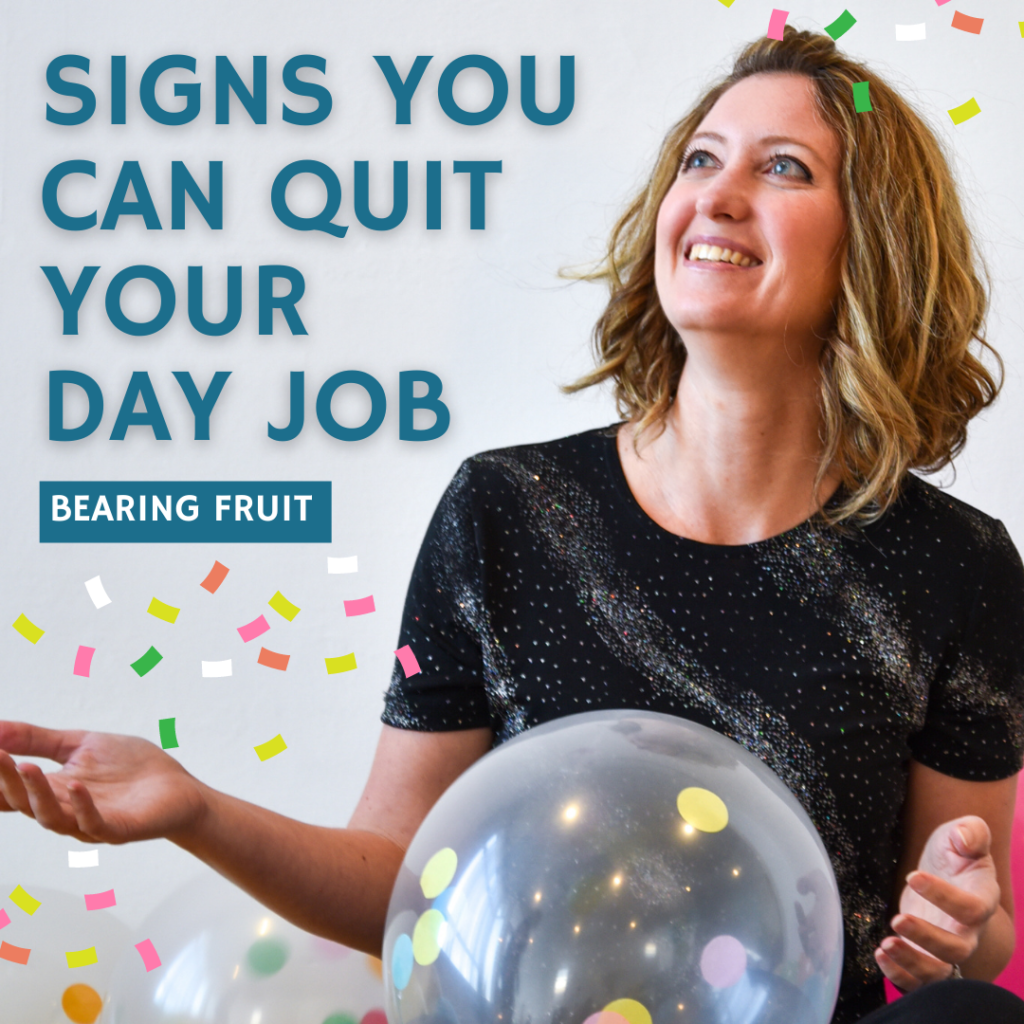Action Faker
My dearest friend is an expert action faker.
For years he dreamed of making an online course about managing your anger.
He bought the URL, drafted the outline for his online course, purchased top notch audio and video equipment, set up his recording studio, and then… nothing.
Failure to launch.
*He’s* the one who told *me* about action-faking.
It’s the name for the phenomenon where you make it appear as though you’re building your business because you’re engaging in activities related to it but you never try to get a client.
It’s deceiving, isn’t it? You trick yourself into believing that printing out some business cards is equal to the brave task of actually putting yourself out there.
Of course, creating a way for people to find you is a part of constructing your empire. So is the website and maybe even the recording studio, if that’s your thing.
In Boost & Bloom, I show students how to lay what foundation (and what can be skipped so you don’t waste your time). And we check in, holding each other accountable, year after year.
Action-faking explains why your second cousin Eric has been “planning his launch” for three years.
It’s what Megan was doing for five years before she joined our course. She’d gotten as far as buying the domain name (a classic action faker move).

“After twenty years in higher education, I was facing an identity crisis. Working with Stephanie provided me with a framework through which I could become crystal clear on the talents that I have and the services that I offer.
The guidance and mentorship helped me work through some perfectionism standards that I didn’t know were holding me back. It really gave me permission to start my own company that I didn’t know I had been waiting for.”
She needed to become an action taker.
The difference between action-faking and action-taking is ultimately a matter of confidence.
Hear me out: You know how you’ll be driving to the swanky lounge to meet friends for overpriced tiny bespoke cocktails but you have this nagging feeling you didn’t lock the door behind you when you left the house?
Most people are afraid to put themselves out there and start getting clients because they’re worried they’re forgetting something crucial to success.
You know that working for yourself comes with inherent risk, so you double down on making sure the house is secure.
At some point, Honey, you’ve gotta get to that swanky lounge.
You get confidence when you have a plan to customize and follow and a posse of peers at your back.
Time to decide you’ve done enough homework. You’re adequately prepared. Time to launch.
Do you ever action fake? I don’t do this in business but I’m an expert at shopping online for clothes, adding expensive sweaters to my cart, then never checking out. Total action faker move (but good for my wallet).
What about you? Write to me and tell me where you’re faking.
Getting Out of Your Own Way
Downtown Kalamazoo got a new tenant:

What do you think is the name of this new business?
I had to look it up on Google Maps. It’s “Anchor’s Aweigh.”
But that logo is gonna drive their customers aweigh, amirite?
Don’t put so many flourishes in your logo that you render it illegible. People need to know the name of your business. This seems basic.
Yet we all do this.
We get between our clients and our services.
You might LOL at this and internally scream at me “MY PROVERBIAL DOORS ARE WIDE OPEN, WHERE ARE THE CUSTOMERS???”
Take a deep breath and let me rewind to August 31st to explain.
August 31st is my Independence Day – the day I quit my salaried job and started working for myself full-time. Every year I celebrate by opening my DMs to anyone with a question about starting or scaling a business.
Here’s one:

The answer to this question is the answer to about 65% of the questions I get:
Get out of your own way.
The biggest obstacle any entrepreneur at any level will ever experience: Your own damn mindset.
Our fears and worries keep us from taking a step.
We fear all the unknowns that go into starting a business, so we never begin. (When all you need to do is ask somebody who’s done it before and has a plan.)
We fear the trolls on social media so we never post. Even if we’ve never actually been trolled in real life. Even when there are ways to handle it. Even when that’s one of the main ways your clients will find you.
We’re scared that our clients won’t believe we have the artistic skill to develop amazing tattoos, so we totally overcompensate on the logo.
Our imposter syndrome keeps us from going after those big, dream clients – when, for all you know, your boutique shop is exactly what they’ve been needing.
Our mindset is “marketing is slimy” so we never actually inform the world that we have services to solve their problems.
Your customers are looking for you. Help them out.
How is your mindset in your way right now? Tell me about it.
If you find yourself thinking “I can’t do that.” the truth is probably actually “I’m too intimidated to do that because I don’t know how to do it well.”
And Babe I’ve got some good news: You aren’t the vanguard.
Other people have walked this path before you. It is well-trodden.
Any worry you have has done been worried already.
It’s been solved.
The answers are out there.
You just need to hook in to the people ahead of you who have plans and some hard-won lessons to share. You need a posse who will hold your hand while you take the next step.
Hang out with me, I’ve got you.
Give Yourself Two Years
To be totally transparent, I’ve thought about closing down the weekly Bearing Fruit newsletter more than once. It takes a lot of *all I’ve got* to write to you this often, especially with some kind of clarity or insight.
And I knew that if the newsletter shuts down, so goes Boost & Bloom, my course for founders.
“It’s fine,” I thought. “This isn’t a big money maker for me. I just love nurturing other people’s businesses. But I’ll get a bunch of my time back and that’s healthy.”
I announced my wavering to my students. One of them immediately wrote back with:
“I just got actual money, in my LLC account 25 minutes before I read this email.”
(It’s these victories that make my heart sing.)
She said, “You cannot scale back on this course. You are two years of snowflakes on their way to an avalanche.”
It takes two years.
She’s right. Building something as complex as a new business (mine included!) takes about two years.
I see this in my taekwondo journey and you can probably map out something similar in your own life.
I recently passed my blue belt test.

At my dojo, that’s halfway to a black belt. If you’re consistent with your practice – meaning you come to class twice a week, practice a bit at home, and dial in your nutrition, sleep, and stress – you can be a black belt in two years.
It took me two years of homeownership to fully realize allllllll the labor it requires.
The first year I planted my garden, it was sparse – just a few flowers. The second year? Total smokeshow.
If I was watching taekwondo YouTube videos once a month, it would take me much, much longer, if not forever to gain the skills of a black belt.
In other words, two years seems to be the shortest time to evolve something new.
The shortcut comes when you have:
A coach, who can give you personal and specific feedback
A plan, showing you what to handle when
Consistency, where you show up on a regular basis week after week
Patience, so you don’t beat yourself up for taking the time it just takes
You need that amount of space to see the seasons.
The ups and downs. To get enough experience that you make mistakes you can learn from. To let word of mouth work its magic. To get comfortable with the discomfort.
It takes two years because there’s so much to build – and you also need to keep your head on your body and your soul intact. Keep breathing.
Though I have nothing but experience to back this up, I think two years is also the time to evaluate if your efforts are paying off.
Let’s say you’ve decided to launch a video series on LinkedIn. You’ve consistently produced weekly, informative videos about your specialty, as a form of content marketing to turn some viewers into clients. If you’ve been working at this for two years and you’ve gotten maybe one client and your videos are only garnering a dozen likes, it’s time to cut your losses and focus your content marketing elsewhere.
If you started a newsletter two years ago but only published twice and you’ve got just your parents on your email list, it’s time to re-evaluate. Perhaps you shut it down. Perhaps you need a coach, a plan, consistency, and patience.
If you’ve been building your business behind the scenes for two solid years before you get your first deposit into your LLC account, you should celebrate. Your hard work is working. That timing sounds about right.
I promised to protect names where requested, so this student will stay anonymous, but check out this result, almost two years after enrolling in Boost & Bloom:
“I’m not exaggerating when I say that the $2,000 class has already led to a 37% increase in my monthly profits. And I only work about 25-27 billable hours a week due to my work/life balance goals.”
(There goes my heart singing again.)
Vinu knew:
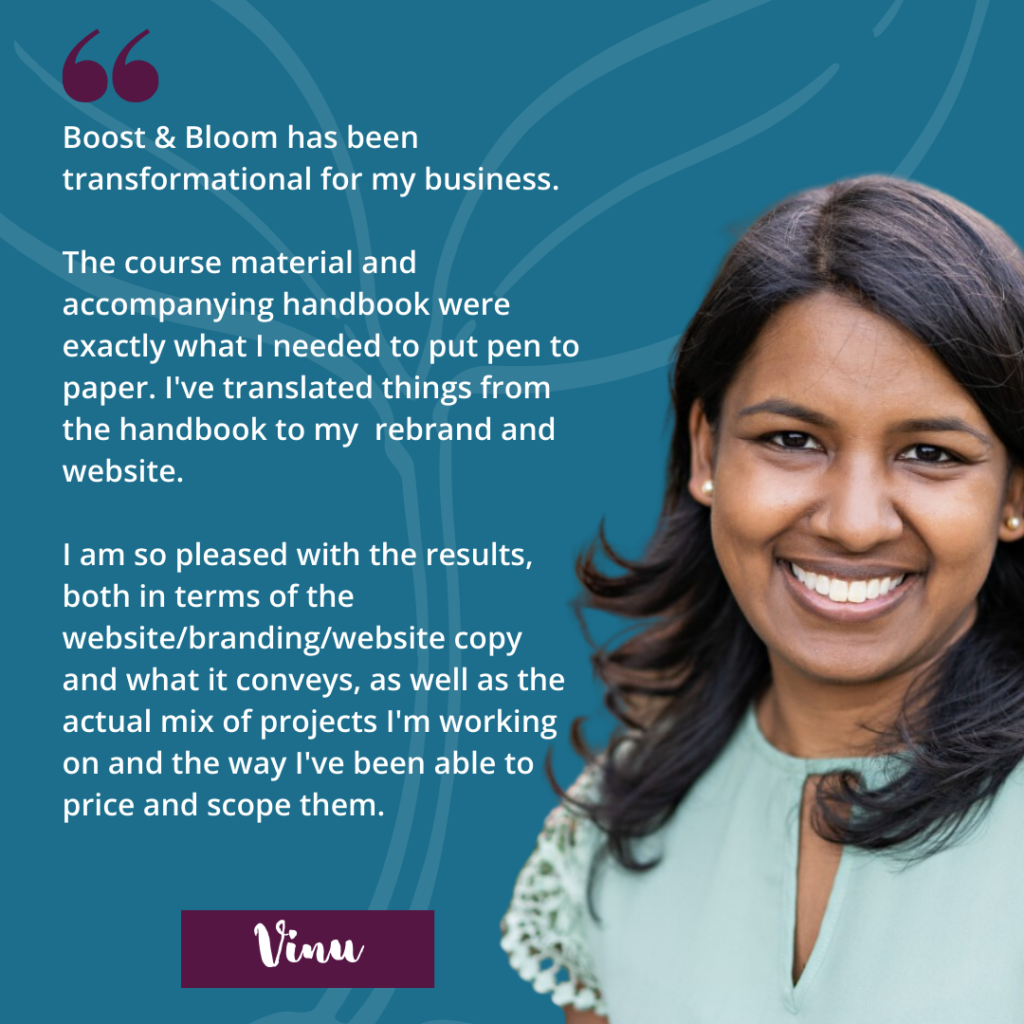
You can feel around in the dark and take forever but you’ll go further faster with a coach, a plan, consistency, and patience.
Folks with businesses already established will see results even sooner. This is what happened to Mara, after only 10 months in my course:
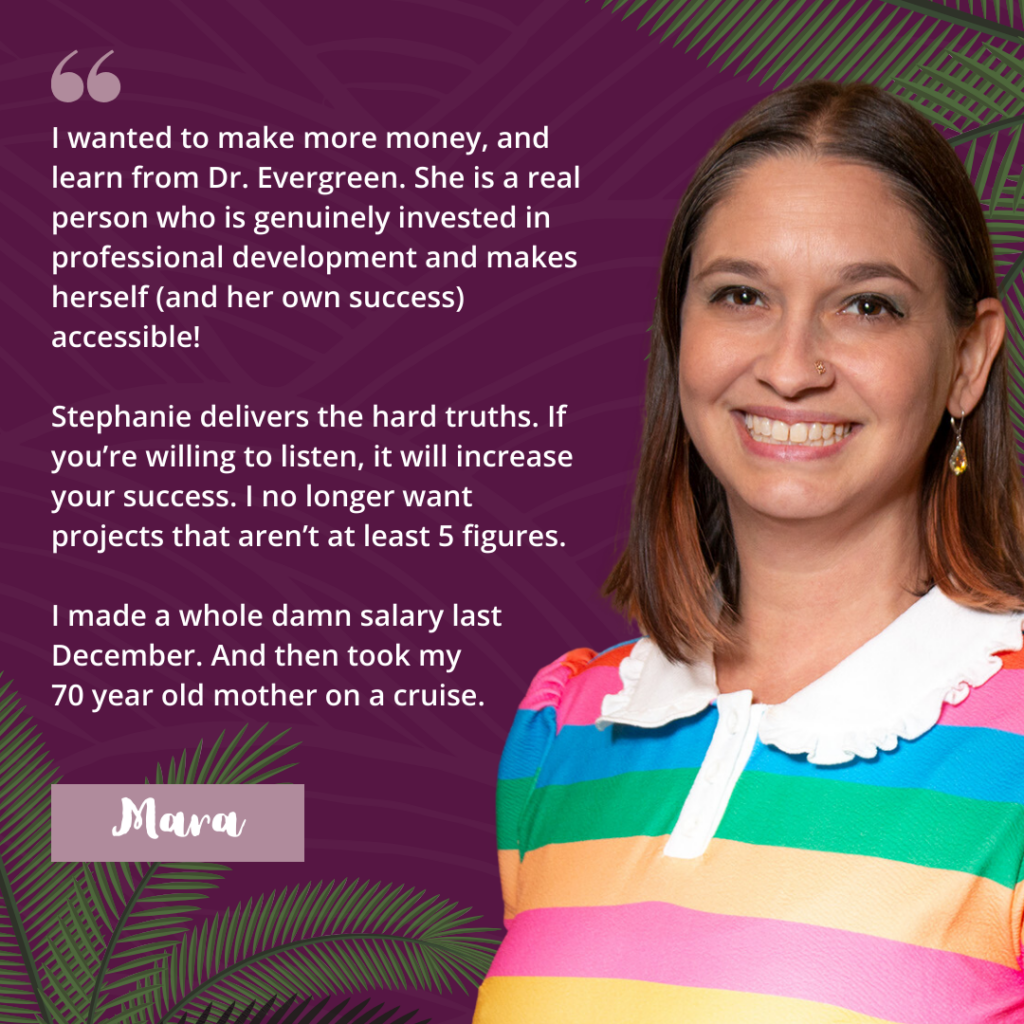
Took her mom on a cruise! Damn, that’s cute.
Join us in Boost & Bloom and give yourself two years to grow. Enrollment closes tomorrow.
I’ll bring the coaching and the plans. You bring the patience and consistency. We’ve got this.
How I Knew I Needed To Start My Own Business
I absolutely did not intend to be an entrepreneur. Had I done so, I would have likely pursued an MBA – which, in hindsight, woulda been a huge mistake. The strength of my business, what gives me so much appeal, is my deep subject matter knowledge. You know, the degrees I pursued instead of an MBA.
But when I was sitting in a coffee shop parking lot, texting a friend, “I think I’m going to get fired” I knew I could run a business better than my boss. This dude could write a grant (and so could I) but he had no idea how to run a company.
In hindsight, there were some clear indications that I needed to work for myself:
I was a bad employee.
Indeed, I’ve had more than one boss refer to me as “insubordinate.” Which would have hurt my feelings had I not already been called “oppositional” by many a teacher throughout my public education experience.
I can’t follow directions. I mean, technically I CAN. But if the directions lack logic or ethics or reason, if they’re unclear or a blanket punishment for one person’s miscalculation, I struggle to abide on principle.
When the head admin would comment “leaving early, are we?” because I was walking out at 3pm when I’d been in the office since 6am and worked a focus group during evening hours the night before, I knew that the concept of a 9 to 5 didn’t square with my work style.
When the hours you spend with your butt in the seat matter more than the fact you could spend those hours playing solitaire, and that makes you mad, you aren’t cut out for a corporate work ethic.
I needed support.
My independent streak might have backfired a bit. Here’s how: I was hired to fill a position that had been formed through a grant. Which meant my job would be up as soon as the grant was over. Unless more grants came in.
And I guess because I showed up eager and smart they thought I could write these grant proposals by myself?
I had not an ounce of experience. You might not be surprised to learn that my first grant proposal was rejected. And the reviewers took the extra special step of calling us up to tell us how totally off-base the proposal was. Thank goodness this was before Zoom because my face was deep red with embarrassment on that conference call.
But right behind that red embarrassment was also some anger. That I was brand new to the job and had been given zero oversight. No one even reviewed the proposal before I sent it in.
I can look back at that now and see that I needed a mentor. When you work for someone else, mentors aren’t guaranteed, even if you have multiple bosses in the org chart. When you work for yourself, you can hire a mentor.
I had ***ideas***.
Girl, let me tell you. I had dream clients to pursue. Projects I’d crafted on paper. Data visualization to invent. There was a world to change.
When I brought in guest speakers, arranged events in their honor, and connected them with local non-profits, my office cheered me on – so long as I did all of those things outside of my work hours.
When it came to anything innovative that would require the company to pay for my time, I was vetoed. And when my good ideas didn’t get heard I would become disobedient.
I began with micro-rebellions. I stopped following the sign taped to the bathroom mirror (only in the ladies bathroom don’t ask how I know that) directing us to wipe down the sink with a paper towel.
The more I felt undervalued, the less I cared about the company, to the point where my boss commented that I looked “sullen” and needed to “smile more.” >screams into the void<
Was I really just gonna phone it in for the next forty years instead of fulfilling my mission on this earth?
I had ***ideas*** for other people.
“You know what would be so cool?”
☝🏼 I say this on a daily basis.
Wanna know how this conversation ends? 👇🏼
“That’s a really good idea, thank you!” >scribbles notes<
That inventiveness is how I launched 3 successful companies. It’s how I teach other accidental entrepreneurs to scale up without breaking down. Inventing game-changing solutions is my favorite part of Boost & Bloom Office Hours.
If you’re also endlessly good at spotting inefficiencies and obstacles AND seeing your way around them, you’ll be good at being a founder too.
When you’re curious about the project’s budget and want to understand how it’s conceived and in the process you have fresh ideas about ways to lower the overhead, you might be cut out to work for yourself.
When you invent a newsletter campaign for the outreach manager because you “just love this sort of thing,” you should consider a job where marketing is one of your many responsibilities.
When you’re as comfortable in business development as you are doing The Actual Work, it’s a sign you should start your own company.
Is this resonating? What would you add? How do you know you should work for yourself? Write me with your ideas.
Here’s to no one ever telling you your coffee break was two minutes longer than allowed.
When Fools Rush In
Fools thinks when you start your own business you’ll just be doing that work you love full time. That isn’t how it works.
Think about it: Even in your day job, only a small portion of your time is spent doing what you love – the Actual Project Work. kat_boogaard summed it up nicely in this pie chart I’m not even mad about:
A typical project is maybe 1/2 Actual Project Work.
The other 1/2 is all the prep and communication and administrivia. So if you work in a job right now and get to spend more than 1/2 of your time doing Actual Project Work, consider yourself fortunate. This means your boss and support staff are handling all that other stuff that you love less.
This also means that if you think you do Actual Project Work better than your boss, it’s likely true! You spend more time on Actual Project Work than she does.
It’s naive to think that if you worked for yourself you’d just Actual Project Work 24/7. Because, my dear, when you work for yourself you also become the boss. You have to do all the things your boss and support staff used to take off your plate.
You actually have less time for Actual Project Work.
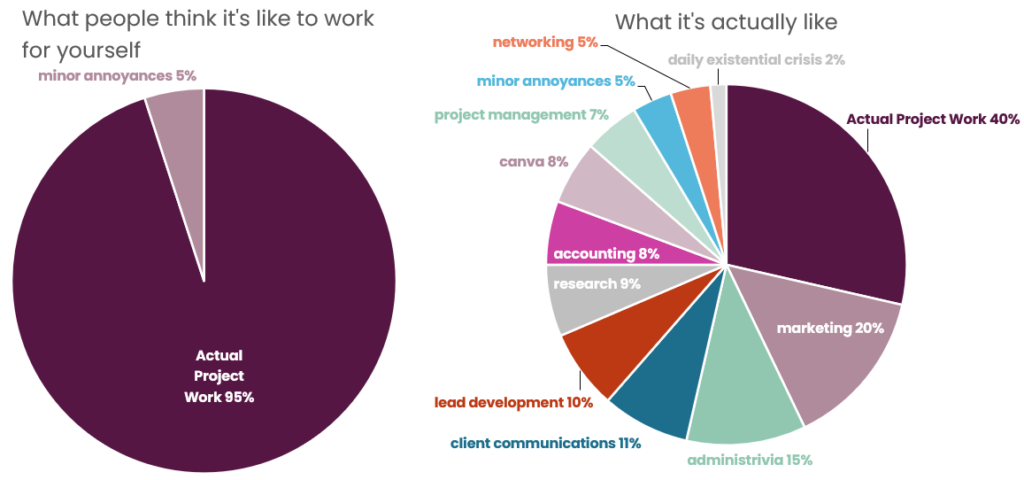
That’s the worst but most accurate chart I’ve ever made. Yes, the more accurate pie adds to more than 100%.
So what does this mean for you if you love the work but hate your job and wish you could work for yourself?
It means you:
Learn to love all the other parts. Ugh, what a drag. Right? Actually, it can be pretty damn cool to tackle “all that other stuff” in a way that aligns with your values. That’s how you run a business with integrity.
In Boost & Bloom, I show exactly how to build a company that keeps your ethics at the core. I’ll walk you through alllll that other stuff so you know what to tend to. I’ll teach you the shortcuts and the tech. And I’ll provide example after example of how to reflect your values along the way. You’ll earn a ton of money and still sleep well at night.

I only open enrollment in Boost & Bloom once a year. This is your chance to get started.
You can also hire out some of the Other Parts that you truly despise. It means your pie divides a little differently, with more time spent on managing others – so you’ve gotta figure out how to love that, too. (We’ve also got your back in Boost & Bloom as you build a small team.)
Many entrepreneurs don’t make it more than two years because they aren’t starting off with eyes wide open. I want you to be healthy and happy – even if that means you don’t start a business and instead just find a better boss.
What Makes Work Meaningful
I learned a new word: Eudiamonia. It means “flourishing and living a life that realises one’s potential.”
I can’t pronounce it, but eudiamonia is all I want.
Work is surely only one component of a flourishing life, but it’s a big one.
Nikolova and Cnossen just published a study that identifies the three big factors that contribute to whether you feel your work is meaningful and satisfactory. The three big factors are:
Autonomy
Which means that you believe you have control over what you do with your time.
Competence
Which means you believe you can figure it out, even if it’s challenging, and that your effort contributes to a greater good.
Relatedness
Which means you believe you’re well-connected to your colleagues and bosses.
If you’re high on these three areas, the researchers say, you’ll be willing to withstand some underperformance in other aspects of job satisfaction. For example, the authors report that nurses usually have a high job satisfaction, even if there are parts of the job that totally suck.
I can hardly understand this, but those three factors were “4.6 times more important” than working hours, pay, benefits, and career advancement.
Pay and benefits were not as important.
Record scratch.
Perhaps if you are forced to choose between purpose and pay, you’d choose purpose. But it’s a false dichotomy.
When you work for yourself, you get to set your own pay and choose your own projects. You get pay AND purpose.
And that’s why these particular results excluded people who were self-employed. The researchers said this was because self-employed people can’t score on relatedness, since they have no peers or bosses. Huh? I have a wonderful group of colleagues. (And the best boss, just sayin.)
If they included the self-employed, it would certainly skew the results, but not because of relatedness. Because we’d be the examples of eudiamonia – where you can do incredibly meaningful work AND have flexible hours and a strong income.
It seems to me that the only way to really achieve eudiamonia is to work for yourself.
When the researchers pulled a subset of the data, where they could include the self-employed, they found “the self-employed enjoy greater mental health and subjective well-being compared to similar regular employees… This well-being premium is often attributed to the utility of being your own boss and having autonomy and flexibility.”
And, I’ll add, BEING PAID WELL.
Did your mental health change when you started working for yourself?
Mine sure did.
And, to note, the researchers pulled this data from the European Working Conditions Survey – so this sample is a particular cut of society. One where it’s common to go on holiday for the entire month of August and take 2 hour lunches with friends.
How do you think these results would differ for people in the American work culture? Or the Indian work culture? Probably a lot, though I don’t know how. So take this with that particular grain of salt.
The researchers added that “career advancement possibilities and working hours are more strongly associated with meaningfulness for the non-self-employed group.”
Which, I’m speculating, is because we the self-employed advance our own careers and set our own working hours. We don’t rely on the benevolent boss to deem us worthy. We are worthy. All of us.
If you haven’t yet taken that spring off the cliff to work for yourself, let this study be one more reason – it’s the best way to achieve eudiamonia.
If you already work for yourself, let this study light you up on the darkest days of entrepreneurism, when you’re dealing with the parts that totally suck. Your chosen path is the best set up to flourish and make the most of this one wild and precious life.
Ok, I can’t end on such a tender note. I’m going to leave you with the one quote from the article that made me LOL:
“Dur and van Lent (2019) document that about one in ten employees finds their job useless, with the share being the highest among those engaging in routine tasks as well as those in sales, finance, public relations, and marketing.” (Emphasis added is mine, I love you people and wish you a flourishing life.)
Talk To Your Boss
Ryan (fake name) told me over Zoom that he was thinking about launching his own business, training dogs to walk on their front legs (fake business).
Me: Cool! When are you putting in your two weeks?
Ryan: Oh I wasn’t going to quit the day job. I just want this to be my side hustle until I can grow it more.
Me: Uh, but isn’t your day job also training dogs to walk on their front legs?
Ryan: Yes, but my boss is cool.
<red flags whipping up in my head>
Ryan: He saw some of my free YouTube videos and totally supports.
Me: He totally supports because that’s bringing business to him, since you work for him. You need to (1) check your employment contract for language around side gigs or competition and (2) talk to your boss about your plans.
Ryan: Ok yeah yeah thanks for the advice but I’m pretty sure I’ve got this.
<six months later, in which time Ryan did not talk to his boss but did announce the launch of his company>
Ryan: My boss is pissed.
Predictably so. I’ve seen this same pattern happen so many times, <insert joke about nickels and retirement>.
Margaret (fake name) got this same advice from me and said “It’s totally cool, our previous CEO knew about my side business and even encouraged me to do it.”
My dear Margaret, did you say “our previous CEO”? As in the one who is no longer your boss?
That’s like telling the cop who pulled you over for speeding that the last cop just let you go free.
Margaret did not talk to her new boss.
Margaret blasted her new business all over social media.
Margaret got fired.
Don’t be like Margaret.
Talk to your boss.
Say something like “I wanted to let you know about my plans to start a side business. I don’t anticipate that it’ll have any impact on my performance here. But I’ll be announcing it soon on social media and I don’t want that to take you by surprise.”
Be prepared with information about what your contract says regarding side work. Especially so if your side gig is similar to the work you perform in your day job.
You may have to speak to details of your plans, like your anticipated clientele, in order to illustrate how you aren’t creating a competing business.
But you don’t want to overindulge.
It’s a tricky conversation, for sure.
I’m not trying to fool you into thinking this conversation is going to be easy or clean.
It could get uncomfortable.
It could lead to putting some agreements in writing or, sorry about this, even more meetings.
Even if you follow my guidance here, there are no guarantees.
I *had* talked to my boss. I had my boss’s approval to work side gigs in writing. Girl, I had receipts!
And it still didn’t matter to HR, who told me I had two weeks to close my side business.
Their rationale: The topic I wanted to develop on the side – data visualization – could potentially become something the company wants to focus on also, at some point in the future, if they so decided one day. So, my side gig was considered competitive.
Hypothetically.
But, listen, bottom line is HR doesn’t care whether their logic is cohesive or fair. It doesn’t matter what your boss put into writing.
So why should you talk to your boss, if the conversation amounts to protection as fragile as an eggshell?
Because you’ll feel like you did it right. You’ll have gone about the process with your ethics and integrity intact, no matter the outcome.
On the other hand, don’t talk to your boss.
If you know your employer explicitly bans side gigs of any kind or you just have a boss that’s a little unhinged, don’t tell them about your plans.
You’ll be fired faster than you can tweet that you’re open for business.
Instead:
1. Build up the infrastructure of your business while you’re still employed.
2. Hoard your salary in a savings account.
3. Then quit your day job and launch your new website in the same day.
What You Need to Start a Business
This issue is about the third question budding entrepreneurs ask me.
The first question is “How do I price myself?” which is understandable but the wrong place to start.
The second question is “How do I find clients?” which is actually what seasoned entrepreneurs need to be asking, too.
The third question is “What do I need to start a business?” and it’s the same thing I still need every day after running my business for 13 years:
Grit, tenacity, and an unwavering trust that you’ll figure it out.
Contrary to popular belief, it is not a six-month runway of savings.
While that’s comfy, sometimes it’s actually TOO comfy. The pressure of a rent payment will light a fire under your tush and activate your tenacity in a way that nothing else can.
That route is not exactly for the faint of heart. It’s just to say that you do not need investors to start or grow a business.
If you don’t have six months saved, you will find out how efficient you can truly be.
You also don’t need to have a stack of clients lined up.
I promise that a lack of clients will force you to put yourself out there in a way you wouldn’t if you were being safe. And even if you get rejected by your first 10, each one of those rejections is a rich lesson in what you need to tweak ASAP.
You don’t need rich parents.
You don’t need to look like Elon Musk, Mark Zuckerberg, Jeff Bezos or any of the other privileged people who seem to have it easy.
The adversity you have faced in your life is your strength. It’s where grit comes from. Grit is what you need to keep going when you get that 10th rejection.
Don’t get me wrong, getting comfortable with rejection is no pizza party. I’ve had more fun writing out my will.
Even these days, 13 years into starting my business, I still have dreamy potential clients turn me down.
You wanna know what helps? Normalizing it. Take a deep breath and email me about your last rejection.
You bring your grit, tenacity, and unwavering trust. I’ll bring the support.
How To Launch a New Offer
My friend, this isn’t my first rodeo. I’ve launched several businesses, each one hitting six figures right out of the gate.
So you’d think I’d have the launch process totally figured out by now. While experience did help me foresee some steps I’d need to take, I still fumbled and it took me way longer than necessary.
As usual, I’d love for you to learn from my mistakes.
So here’s the diagram of my last business launch. Whether you’re launching a totally new business or just looking to sprout a new branch for your existing business, you’re likely to run through the same phases. Though if you look carefully at my mistakes, you can probably do it faster.
LAUNCH PHASE 1

I truly believe most businesses are born from frustration. When we find ourselves engaged in something so poorly executed, we’re like “I could totally do this better.” In fact, a lot of armchair consultants on Twitter pull inspiration from this very place. Your hyper critical friend lives here and has a dozen new business ideas every day.
Nothing much beyond grumbling typically happens – until the flash of a truly better idea comes, along with the details that make it a viable product. I had fluorescent flashcards and a notebook and a lightning bolt at 3am that helped me hammer out the product and the plan.
Then I entered the likely avoidable span of time where I overthought it. The plan was awesome. My experience told me it was going to take me a lot of time and energy to turn it into reality.
And then I questioned myself.
Where would the time and energy come from?
Did I actually even want to do it?
Would people buy this product from me? Who, exactly?
Haven’t a bunch of other people already done this? What makes me think mine will be better?
I know what’ll help me answer these questions: Listening to every single possible business coach.
Geez that was a huge waste of my time.
You’d think, by now, I’d know not to let these thoughts distract me. Maybe this stage is unavoidable. Yeah, maybe we all have to go through it. But it doesn’t have to take as long as mine did. And we can feel these feelings while also continuing to make progress. Without letting those self-doubting thoughts freeze us in place.
LAUNCH PHASE 2
The key to getting out of the self-doubt whirlpool is to focus on the people you want to serve.

They have needs and they don’t have time for you to mess around.
In my case, I have new and seasoned entrepreneurs in my DMs nearly every day, asking to pick my brain for 15 minutes. I said yes to a few of these folks, seeing it as an equal exchange – I’ll give advice and they’ll teach me about my audience.
Once I had my audience figured out, I started to build the business’s infrastructure, with those particular people in my mind at all times.
I sorted out the framework/structure/package for my services. This is the part most people skip cause they don’t know they need it. But you have to create the container. Give it a name.
Then I brainstormed the business name and connected with my web developer to (1) figure out if we could even do this, (2) research URLs, and (3) start the build.
People usually spend too much time in this phase. They’ll create business cards and deliberate over the web site design and consult 800 people about their business name…. and then never actually launch. Don’t get stuck here.
Then it came time to actually build the program. I had to write out my curriculum – which ended up taking me much much longer than I had planned. The amount of solid business advice that had been just rolling around in my gray matter – honey, the curriculum was longer than any book I’ve ever published.
Took me forever to get it all out of my head.
At the same time, I was planning the marketing strategy, coordinating with my web guy, and shooting the videos. This was a super intense time that I wish I had been able to spread out more.
LAUNCH PHASE 3
Phase 3 is go time.

I launched with a newsletter (hi! This one!) while I was still finishing the website build and testing everything.
I developed some freebies while still testing everything.
Then I announced the new program and opened enrollment. The hard work is supposed to be done at this point so I make it a priority to celebrate with my friends and family.
However, students were unearthing issues we hadn’t found in any previous testing. I don’t know how. But this seems to happen every time I launch. And I think it may be unavoidable? This is why restaurants have soft launches. Maybe we all need our own version of a soft launch.
Every step of the way I’m making mental note of what worked and what didn’t. I formally collect all of those thoughts in a debrief session with my project notebook. *IF* I’m gonna ever do this again, there’s no freakin way I’ll remember every single tweak I’d want to make unless I write them down while they’re fresh in my mind.
Then I chew on those lessons learned while watching student successes and monitoring my own mental health and it’s those things together that lead me to the final point in the process: Do I want to do this again?
And I do.
I’ll open Boost & Bloom again in Feb. Get on the VIP list for early access and a discount.
I’m already thinking about another business, too. I’m in the “I can do it better” stage. This next time around, I’ll be on the lookout for the tedious overthinking stage and do my best to skip it.
I hope you will, too.
What stage are you in? How long are you giving yourself until the next stage? Do you even know what your next stage is? Email me with a note about where you are right now.
Your launch doesn’t have to look like mine. But please at least consider my sequence of steps and my mistakes and make adjustments to get to your next launch faster, better, stronger.
Looking Forward to Freedom
I got to cutest, most sweetly naïve DM from Angela:
“Can I have my own business and also have a lot of time off, especially in the summers, to spend with my young children?”
What would you say to Angela?
My reply was “HELL YES! That’s kinda the whole idea!”
When you work for yourself, you get to create the life you want to live.
In a big picture sense, that means you aren’t necessarily tied to a specific geographic location – you can work wherever you want, in theory.
In a small picture sense, it means you have the freedom to construct each day of your life on your own terms. However you want it to go. You get to make it up!
I freakin love that level of autonomy.
Angela will too. Because it means that if she wants summers off with her kiddos, she has the freedom to book all of her clients during the school year, even during school hours, so that when the bell rings, she’s there to pick them up.
It might seem like this is only possible if you work in a digital consulting space, but not so.
My all time favorite pizza shop closes for entire weeks out of the year so they can all go on vacation.
The framemaker a few blocks from me put up a sign that said “Out for the summer. Reopening September 5. By appointment only.” The quality of his work is so high and people are willing to pay a premium for it, that he can have a brick-and-mortar that’s only open for appointments.
In a more micro picture sense, the way you structure each day is a part of the freedom entrepreneurship gives you.
Lots of newbie entrepreneurs initially set up their days to mimic whatever corporate or academic environment they came from. 8 hours a day, butt in chair. Work through lunch. Clock out at 5.
And if that’s your jam, rock out.
But you’ve got options.
You’ve got freedom.
My daily structure has changed with the seasons of my life. When my kid was younger, I mostly followed the school day schedule, working 8-3 each day of the school year and 10-4 during the summer, getting in exercise and errands after school let out. (PS – those are 6 hour work days, in case ya didn’t notice.)
I have LOVED being there for my kid before and after school – a privilege that so many folks can’t usually enjoy.
Now that my kid is older, I wake up and read a book with my coffee. I go for a long walk or tune into a YouTube yoga class or pretend like I know what I’m doing at the pilates studio. Then I start work around 10:30. Heck, I’m writing this at 11am on a Saturday because he’s a teenager and he’s still sleeping.
I didn’t work Fridays at all this summer. I’ve taken SEVERAL weeks of vacation. We’re looking at a house in another country.
Other people embrace their night owl nature and work 3-midnight.
Some folks, like the owner of my nail salon, want a weekday off to grocery shop or whatever without the crowds, so they trade Sundays for Thursdays.
I’ve heard of people who make all the money they need for the year starting in January and as soon as they hit their financial goal, the rest of the year is totally off.
And this is all aside from the new digital nomad model where you literally take your computer and work from the world’s best coffee shops.
I’m just throwing out ideas here, to help you dream.
How you shape your day and your life is up to you.
That’s the kind of flexibility and freedom you get when you’re the boss.
But listen: The only way you can afford to work 4 6-hour days per week and take off as much time as you want and work from anywhere in the world is to be highly focused and self-disciplined in the time you are on the clock.
I can’t spend that time scrolling IG, hopping on every latest trend. I have to give my sole focus to the actions that keep my business strong.
With freedom comes great responsibility.
So, my friend, what will you do with that freedom? What’s the thing you want to have space for in your day or your life, that entrepreneurism can bring you?
For you seasoned entrepreneurs, what have you enjoyed most about that flexibility? Or did you forget that you’re the boss?
I can’t wait to hear what you have to say. Email me.
There’s joy in that freedom. Let’s find it.
Just Start
I’m gonna pre-apologize right now. Cause this post from Sun Yi’s Instagram is so accurate, it hurts.

Let’s say I want to buy a house in Portugal. It’s been a lifelong dream and I finally feel like I’m in a place in my life where it could reasonably happen soon.
I’m absolutely not jumping on a plane and flying to Lisbon and buying the first house I see.
I’m going to read up on the rules of international house buying. Join an online ex pat community and listen in for advice on fun neighborhoods. Talk to my family.
Then – and this is THE MOST IMPORTANT PART – I’m going to start a conversation with a real estate agent in Porto. That’s when it gets real. And that’s the step we put off.
Because there’s always more research to be done. Another influencer with the one tiny tip that’ll make or break you – better keep scrolling. Right?
Honey, you’ll scroll your whole life away.
The difference between being a wantrepreneur and an entrepreneur is in the balance you strike between researching and doing.
Stop researching and go get a client.
How?
How does anyone get clients? You sell yourself. Talk about your work. Reach out to people who need your services.
That’s when it gets real.
Real scary.
“I want to be an entrepreneur, but I’m scared it won’t work. I’m scared I can’t do it.”
For reals. Those are true legitimate feelings that don’t fully go away, ever. It IS scary.
Now that we’ve settled that, can you view fear as that annoying colleague down the hall and just do your work anyway? Todd in Accounting as been training you for this for years.
There’s just no other way around it. Put yourself out there and focus on getting clients first. You’ll figure out everything else as you go.
“I don’t know what steps are involved – better read yet another CEO’s book.”
Everyone’s path is going to look differently but the one thing you can trust is that, once you start walking, the next step will be revealed to you.
I had just a couple clients under my belt when a prospective and I were emailing back and forth and she said “This sounds great. Do you have a website I can show to my team members?”
No ma’am I do not. But I’ll have one up tomorrow.
The next step shows up at your feet if you just get started.
You build it as you fly.
“I need a lot more experience first.”
Um, how do you think you get experience? You have to go get clients.
You might be thinking, who wants to work with someone so new? You wouldn’t want a surgeon on their first surgery, would you?
I don’t know about that. The best cleaning I ever got was from a dental hygienist who had just graduated. She was well-researched – no one could know more about the most current best practices. And her freshness made her sooooooo careful and detailed.
Listen, your experience will perfectly match someone’s budget. Just go find your someone.
So yes, of course, you need to do some research. But instead of thinking that there’s a research phase and then a doing phase, think about researching and doing simultaneously, back and forth, onward. Both at the same time.
If you want to actually reach those big dreams – that house in Portugal, that business empire, that award-winning YouTube channel – you have to switch to DO mode. Contact the real estate agent, connect to your first client, make your initial video.
Yeah, the first one will suck. So get it out of the way as fast as you can.
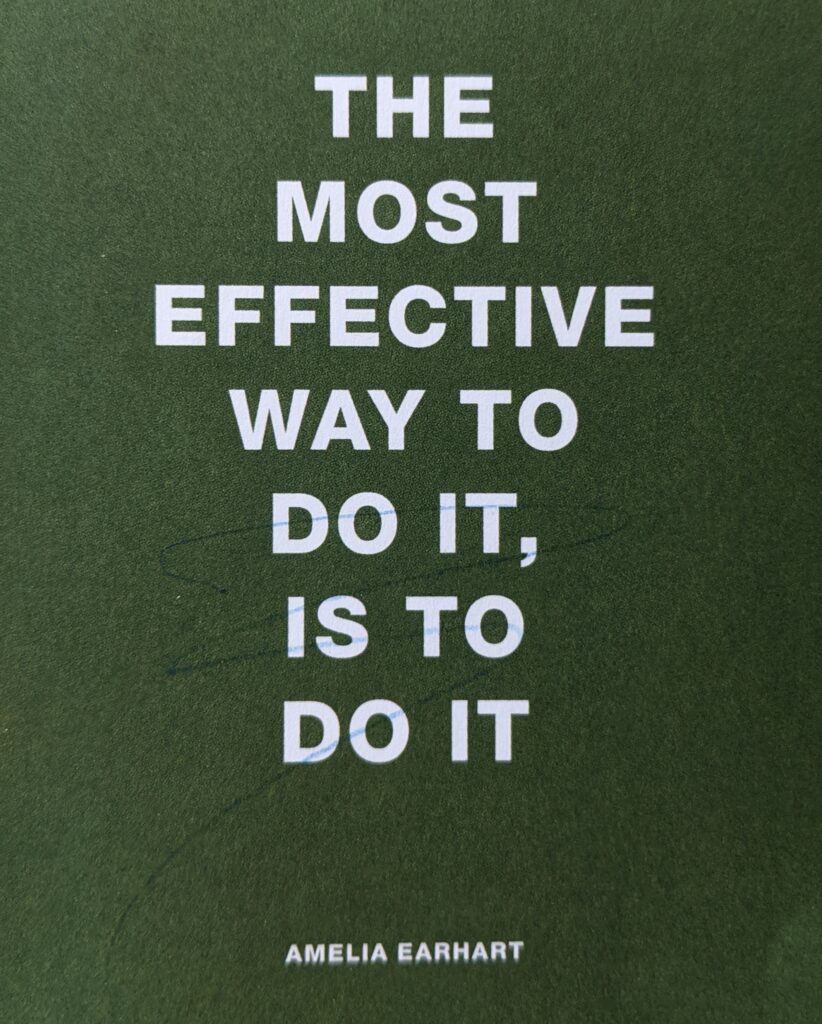
So, what’s the next big thing you want to do? The thing you’ve had your heart on but haven’t actually *done* yet? Hit me up for a little pep talk.
Signs You Can Quit Your Day Job
THE LEAP! The leap feels so big. Quitting your day job to launch your own empire is full of so much anxiety, fear, curiosity, hope, and thrill.
Most of us aren’t equipped to sort through that many emotions, all happening at the same time. It’s like the Jungle Juice from your college years. And most of us weren’t equipped to handle that either.
So, while there’s no one path to entrepreneurship, let me help you sort out when you’ll know you’re ready to take that leap.
Money & Insurance
The biggest burning questions I get in my DMs are fears about money and insurance.
If you’re in the position to stay in position, do it. By that I mean, if you’re able to stay in your day job while you grow your empire on the side, that’s the most stable situation. Yes, it’ll mean you’re sacrificing some nights and weekends but if you’re just rewatching Breaking Bad again, you won’t lose much.
When you’re earning 75% of your day job salary through your side empire, you’re in a position to walk.
I mean, I walked without having much lined up. People do it all the time. But ideally you’ve built enough of a bridge to make the leap more like a hop.
You only need to get 75% of your salary covered because once you take the leap you’ll have a lot more time on your hands for business development to get you to 100% +.
The + also includes covering your insurance, which is probably the #1 block for people in the US who have to suffer through employer-based insurance programs. It’ll become a cost of doing business. You can handle it. But now’s the time to research how much you’ll be paying and add this cost to the list of expenses you’ll incur regularly (you’ll use that list to help you figure out your pricing).
Thing is – people get jungle juice feelings about money and insurance but it isn’t the first thing to sort out.
Offer/Service/Product
What the hell do you sell, Honey? You have to start here.
What do you offer in exchange for money? Usually it’s some kind of product or service. To make a successful leap, you’ve gotta articulate exactly what you sell and package it up in a way that potential buyers can clearly understand.
It’s one thing to say “I’m a stylist and I’ll tell you what to wear.” Dime a dozen.
It’s waaaaay more attractive to say “I’ve got a curated box of clothes in your size and style that I’ll mail to you once a season.” THAT I would buy. It’s packaged. Ok, literally – a box of clothes – but conceptually too and that’s the more important part.
And even more important than that is the underlying mechanism you develop to actually deliver the offer. You can’t just *say* you sell a box of clothes, you have to actually set up the processes by which you’ll find out what customers want, establish relationships with stores, think through the packaging (physical this time – the cardboard box you’ll mail).
You need the idea, plus the processes to make the idea happen. Figure that stuff out first.
Client Demand
The second thing you need in order to quit your day job, right after the idea and process, is the clientele. Almost everyone has their first clients long before they get their first logo.
Client demand can start out small – like, you told your idea and process to a friend, who told a friend, who wants to work with you now. Even if you aren’t ready yet, that counts as client demand.
If you find yourself saying no to some potential work because you’re out of hours in the day, that definitely counts as client demand and that’s how you know you can walk… or leap.
(By the way, I used these same signs to help me navigate my process of cutting out some income streams that I don’t like and leaping over to others that bring me more joy – uh, like Boost & Bloom. This ain’t just for the newbie entrepreneur.)
A strong, sustainable empire will also require branding and marketing and systems and strategies and you’ll build all of that as you go. Don’t worry about it now. Just get product, demand, and money sorted out and you’ll be ready to quit your day job.



